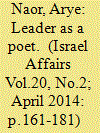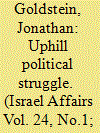|
|
|
Sort Order |
|
|
|
Items / Page
|
|
|
|
|
|
|
| Srl | Item |
| 1 |
ID:
122063


|
|
|
|
|
| Publication |
2013.
|
| Summary/Abstract |
The hallmarks of the Revisionist political platform, such as opposition to the project of the enlarged Jewish Agency or the idea of fundamental land and fiscal reform in Palestine aimed at an intensification of the settlement endeavour, began to appear spontaneously, particularly in Russo-Ukrainian Zionist circles, during the second quarter of 1922. The so-called 'Our Platform', a series of articles setting out the Revisionist proposals, published in March 1924, was a joint undertaking and the culmination of numerous, sometimes inconclusive, discussions. The creation of the Union of Zionists-Revisionists sealed this process in 1925. The aim of this article is to investigate the three-year prelude to the organized Revisionist movement, highlighting the role performed by activists, almost all of whom have been forgotten over time (J. Brutzkus, S. Gepstein, J. Schechtman and I. Trivus, among others). It identifies the opposition to the enlarged Jewish Agency project (and not the rejection of the White Paper of 1922) as the main galvanizing point of the process. Last, but not least, it argues that many of the political notions commonly attributed to Jabotinsky actually originated with others among the Revisionist founders.
|
|
|
|
|
|
|
|
|
|
|
|
|
|
|
|
| 2 |
ID:
131855


|
|
|
|
|
| Publication |
2014.
|
| Summary/Abstract |
This article analyses Ze'ev Jabotinsky's Zionist ideology as expressed in his political poetry. It includes inter alia lessons from the pogroms, the need for emergence of 'a new Jew' who would show by his conduct that he is 'a son of kings', who is ready to either die or capture the mountain, believing in the Jewish national right over the Land of Israel on both banks of the Jordan, as well as in the rights of its Arab and Christian inhabitants. These and other ideological principles appear in his poetry alongside a war of words with the Zionist left.
|
|
|
|
|
|
|
|
|
|
|
|
|
|
|
|
| 3 |
ID:
158155


|
|
|
|
|
| Summary/Abstract |
Russian-Jewish army officer Joseph Trumpeldor (1880–1920) was arguably the most celebrated Jewish military hero of the first half of the twentieth century. He lost his left arm during the Russo-Japanese War of 1904–1905 and endured a year-long Japanese imprisonment. In 1905–1906, en route back to European Russia, Trumpeldor visited the Manchurian city of Harbin and attempted to impart Zionism to the local Russian-Jewish population, albeit with very limited success. Trumpeldor’s personal commitment to Zionism received its fullest expression in 1912 when he emigrated to Kibbutz Degania in Ottoman Palestine and subsequently died in defence of the Tel Hai farming community. His career inspired the Zionist movement named after him, Brit Trumpeldor. Abbreviated BETAR, it influenced leaders of the Jewish exodus from China in 1948–1949 and energised the Herut/Likud parties in Israel. Viewing Trumpeldor as only partially successful in his political efforts in Japan and Manchuria may somewhat tarnish the myth of the one-armed soldier and pioneering farmer. The inclusion of the Japanese and Manchurian dimensions of Trumpeldor’s uphill political struggle situates this hero within a far more realistic, and less Eurocentric, context.
|
|
|
|
|
|
|
|
|
|
|
|
|
|
|
|
|
|
|
|
|